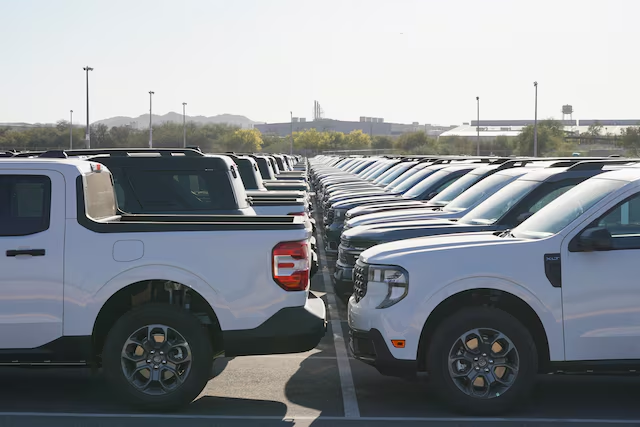In a bold move to reshape the U.S. auto industry, President Donald Trump announced on Wednesday that his administration will impose a 25% tariff on imported cars and auto parts, set to begin April 2. The new tariffs threaten to disrupt the global supply chain that keeps U.S. automakers running smoothly. Experts warn that the move could significantly impact car manufacturers’ profits and raise vehicle prices for consumers across the country.
The new tariffs will initially apply to finished vehicles, but the levies on essential components like engines, transmissions, and electrical parts will come later, with some exemptions for imports from Canada and Mexico. Despite these delays, the tariffs could lead to steep price increases, potentially adding thousands of dollars to the cost of a new car. The decision has sent shockwaves through the industry, especially for companies that rely on international production and supply chains.
Global Supply Chains Under Pressure
The announcement of the 25% tariffs marks a significant shift in U.S. trade policy. The tariffs will directly impact foreign automakers, especially those with limited manufacturing operations in the United States. Japanese automaker Mitsubishi Motors, for example, saw its stock drop by 5% in early trading on the Tokyo Stock Exchange after the news broke. Even U.S.-based manufacturers like General Motors (GM) and Ford Motor Company, which build a significant portion of their vehicles outside the U.S., are bracing for the economic fallout.
According to Bernstein analysts, GM and Ford, which manufacture 48% and 18% of their vehicles abroad, respectively, will not be immune to the impact. While these companies may benefit from temporary exemptions for parts sourced from Canada and Mexico, they could still face a substantial cost increase if the tariffs remain in place. Ford, in particular, may see domestic content on some of its U.S.-built vehicles drop to 30%, meaning a larger portion of their parts could be subject to tariffs.
Financial Impact on the U.S. Auto Industry
The new tariffs are expected to generate significant revenue for the U.S. government, with estimates ranging up to $100 billion annually. However, this revenue comes at a cost. If the tariffs are applied to both finished vehicles and key automotive parts, experts predict the total price of a new car could rise by as much as $5,000 to $10,000. With an estimated 16 million cars sold in the U.S. in 2024, this price hike would represent a 13% increase in industry sales, an amount that could devastate carmakers’ already slim profit margins.
For example, General Motors and Ford currently operate with operating income margins of just 8% and 6%, respectively. The additional cost burden created by the tariffs could overwhelm their financials and make it difficult for them to absorb the price increase. GM CEO Mary Barra has stated that the company will do what it can to offset the impact, including bringing vehicles into the U.S. before the tariffs take effect. However, experts predict that in the long term, these costs will inevitably be passed on to consumers, many of whom are already feeling financial strain from rising living expenses.
The Long-Term Road Ahead for U.S. Automakers
Despite these challenges, there is some logic behind the Trump administration’s move. During his first term, the Department of Commerce reported a decline in U.S. automotive industry research and development spending. This drop in R&D spending has raised national security concerns, especially as competitors like China make rapid strides in the development of electric and autonomous vehicles.
However, critics argue that the tariffs may go too far, too fast. The U.S. auto industry relies on a vast, interconnected global supply chain, and forcing a sudden shift could cause irreparable harm to manufacturers and suppliers alike. The shift towards self-driving and electric vehicles is an expensive and complex process, and disrupting this supply chain could be a costly mistake. In short, it may be too much, too soon.
What’s Next for the U.S. Auto Industry?
As the tariffs take effect on April 2, industry insiders are watching closely to see how the auto industry adapts to the new reality. The next few months will be crucial in determining whether the tariffs lead to a major disruption in car production and sales, or whether temporary exemptions and other adjustments can help ease the burden.
For now, the auto industry faces a tough road ahead, with rising costs, potential job losses, and a shake-up of long-established trade practices. If the tariffs are extended or expanded, their effects could be even more far-reaching, leaving the U.S. auto industry to navigate a challenging future.

